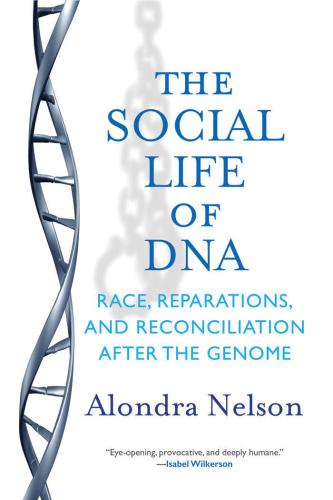
The Social Life of DNA
Race, Reparations, and Reconciliation After the Genome
کتاب های مرتبط
- اطلاعات
- نقد و بررسی
- دیدگاه کاربران
نقد و بررسی

October 26, 2015
Sociologist Nelson probes the “perceived omnipotence” and “growing utility” of genetic testing in the modern United States in this study of African-American interest in the technology for ancestry research. While focusing on one particular company, African Ancestry, she also attends to the African Burial Ground National Monument in New York City, the slavery-reparations lawsuit Farmer-Paellmann v. Fleet Boston, and the Leon Sullivan Foundation’s Global African Reunion, aimed at strengthening links throughout the black diaspora. Venturing abroad, Nelson covers the work by Mary-Claire King, an American geneticist, with the Argentinian organization Las Abuelas de Plaza de Mayo (Grandmothers of the Plaza de Mayo), which traces the children of people murdered by the government during the 1970s Dirty War. The language involved in discussing the human genome is, of necessity, often technical, but Nelson’s work is supplemented and enlivened by interactions with “root-seekers” at a variety of gatherings. An early stimulus to much of this work, the 1977 blockbuster miniseries Roots, is acknowledged, as is its modern-day offspring, genealogy-themed reality TV shows. Nelson’s conclusions are primarily of academic interest, but the current fascination with genetics testing may also attract general readers.

November 15, 2015
Genealogical studies by black Americans have grown in popularity once companies were able to provide DNA analyses "direct to consumers." Has it helped civil rights? Social justice? Legal claims? Yes and no, writes Nelson (Sociology and Gender Studies/Columbia Univ.; Body and Soul: The Black Panther Party and the Fight Against Medical Discrimination, 2011, etc.) in this meticulously detailed study. Fascination with African origins took off in the 1970s with the publication, and subsequent TV adaptation, of Roots. It got a further boost in 1991 when excavations in New York City unearthed a slave graveyard dating to the late 1600s and one of the first-ever DNA analyses was conducted. The research was controversial, but it led to the realization that DNA could establish ethnic linkages to the West African countries that were the sources of the slave trade. These "reconciliations" have been immensely important and satisfying to black genealogy tracers, creating an identity linked to centuries-old cultures and kin, even leading to dual citizenship in some countries. Most of these analyses have used the commercial firm African Ancestry, founded by a geneticist, Rick Kittles, who had worked on the New York burial site and whose fame and occasional controversy are woven into the text. As for social justice, the story is not so sanguine. Social activists have argued for financial reparations for the unpaid slave labor of their ancestors. Class action suits against the government have failed due to statutes of limitation and sovereign immunity. So, interestingly, activists have sued corporations, such as the banks that lent money to slaveholders and the insurance companies that covered the lives of slaves. These, too, have legally lacked "standing" primarily because the DNA of descendants is linked to tribes and ethnicities rather than to distinct individuals. Nelson adds another chapter to the somber history of injustice toward African-Americans, but it is one in which science is enriching lives by forging new identities and connections to ancestral homelands.
COPYRIGHT(2015) Kirkus Reviews, ALL RIGHTS RESERVED.

March 1, 2016
Nelson (dean, social sciences, Columbia Univ.; Body and Soul: The Black Panther Party and the Fight Against Medical Discrimination) describes her participant-observation research on black American genetic ancestry testing. For some African Americans, these DNA tests promise authoritative, scientifically based insight into lineages formerly obscured by written records containing minimal information, the fragmentation of families, disruption of orally transmitted history, and the dehumanizing conflation, caused by the slave trade, of hundreds of distinct African ethnicities into a single American race. Activists have even attempted to use genetic testing data as evidence of ancestry in class-action lawsuits seeking reparations for the harms of slavery. Yet, as Nelson cautions, DNA tests are tools, not solutions. They do not constitute either absolute or comprehensive proof of ancestry; their results cannot make African Americans full members of their ancestral communities; and on their own, they will not lead America to reexamine and reinterpret history. VERDICT Although occasionally repetitive, this book raises significant issues worth consideration by genealogists of all ethnicities (and the librarians who assist them), and provides intriguing descriptions of the use of science in pursuit of social justice.--Nancy R. Curtis, Univ. of Maine Lib., Orono
Copyright 2016 Library Journal, LLC Used with permission.

























دیدگاه کاربران